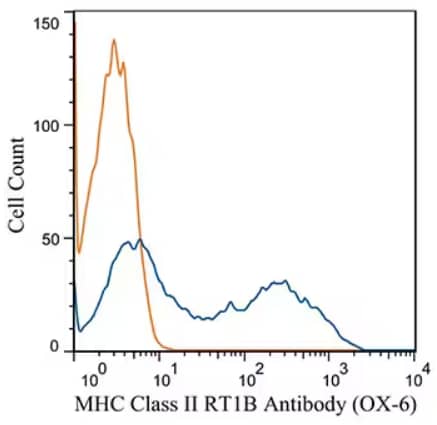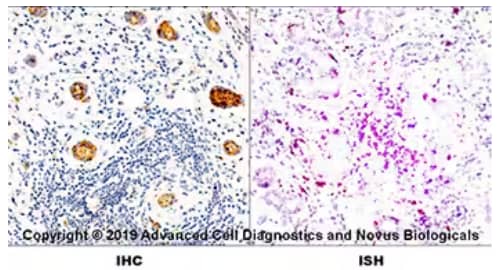By Victoria Osinski, PhD
An exciting paper by Casasola-LaMacchia et al. presents a novel mass spectrometry method for detecting different MHC class II isotypes in multiple cell types.1 Their results not only present a new useful method for measuring subsets of these molecules, but also intriguing findings regarding regulation of MHC II expression.
The major histocompatibility complex II (MHC II or HLA II) molecules are expressed on antigen-presenting cells (such as dendritic cells (DCs)) and play an important role in adaptive immune responses by presenting immunogenic peptides to CD4+ T cells. Human leukocyte antigens (HLAs) are dimers consisting of alpha and beta chains. Expression of each HLA chain is driven by multiple loci within the larger MHC gene complex. Variants of these different HLA alleles (DR, DQ, DP, DO, DM) have been strongly associated with certain diseases, including type 1 diabetes.2 Some of these variants translate to differences in protein structure.2 This paper1 and others3, however, remind us that the regulation of MHC II alleles is more complicated than that: co-factors, variants in non-coding regions of the gene, and post-translational modifications are additional factors.1

Flow Cytometry analysis of rat splenocytes stained Alexa Fluor® 488 conjugate of Anti-Mouse MHC Class II RT1B (OX-6) Monoclonal Antibody (NB100-65541) (blue line) and a matched mouse IgG1 isotype control (orange line).
Major findings quantify and introduce new questions about HLA expression
In this study, the authors develop a novel liquid chromatography tandem mass spectrometry (LC MS/MS) method to isolate total HLA II proteins from cell lysates using an anti-panHLA-II antibody (HB-145) and measure the concentrations of alpha chain isotypes HLA-DRA1/DQA2, -DPA1 and -DQA1. They do this by monitoring the proteotypic peptides VEHWGLDEPLLK, VEHWGLDQPLLK, and VEHWGLDKPLLK, respectively. Dendritic-like cell lines MUTZ-3 and KG-1, as well as human monocyte-derived DCs, were stimulated with LPS and HLA-DRA1/DQA2, -DPA1 and -DQA1 isotypes were measured using LC MS/MS.
Their findings demonstrated that the HLA II alpha chain in all samples was predominantly made up of HLA-DRA1, followed by HLA-DPA1, while HLA-DQA1 was not detected in all donors. Interestingly, LPS stimulation of these cells increased total cell surface HLA II expression as detected by flow cytometry in human DC samples. The same treatment, however, did not change the levels of each HLA-II isotype from whole cell lysates when measured by LC MS/MS. These results highlight that HLA-II abundance is also likely regulated by biosynthesis, translocation of the protein to the membrane, and stabilization at the membrane.
This approach will be useful for studies on various autoimmune diseases associated with certain HLA haplotypes and variants including type 1 diabetes and rheumatoid arthritis. It can also be applied to more specific studies investigating the mechanisms driving HLA isotype abundance in DCs and other antigen-presenting cells.

Orthogonal Strategies Validation. Dual RNAscope ISH-IHC showing formalin-fixed paraffin-embedded tissue sections of human metastatic tonsil probed for HLA-DR mRNA (RNAscope probe catalog # 475891; Fast Red chromogen, catalog # 322500). Immunohistochemical analysis was performed on adjacent tissue section with Anti-Mouse HLA-DR Monoclonal Antibody (NB100-77855), followed by incubation with the Anti-Mouse IgG VisUCyte HRP Polymer Antibody (VC001) and DAB chromogen (yellow-brown). Tissue was counterstained with hematoxylin (blue).

Victoria Osinski, PhD
University of Minnesota Medical School
Victoria is doing her post-doctoral research fellowship at the Center for Immmunology studying vascular and immune mechanisms driving autoantibody-mediated mitral valve disease.
-
Casasola-LaMacchia, A. et al. (2021) Human leukocyte antigen class II quantification by targeted mass spectrometry in dendritic-like cell lines and monocyte-derived dendritic cells Scientific reports
-
Jones, E. Y. et al. (2006) MHC class II proteins and disease: a structural perspective Nature reviews. Immunology
-
Duffy, E.B. et al. (2017) Evolving Insights for MHC Class II Antigen Processing and Presentation in Health and Disease Current Pharmacology Reports